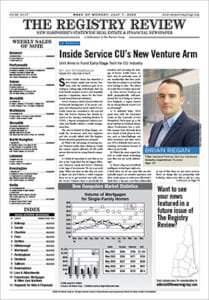
Lew Sichelman
Some homebuyers are about to catch a break, courtesy of the Federal Reserve Board and other banking regulators.
As long as the price tag on their new homes is below $400,000, these lucky purchasers will no longer have to pay for a mandatory appraisal. But the other side of the coin isn’t as positive: How will buyers know if they’ve overpaid?
After all, if the appraisal comes in below the agreed-upon price, you can back out of the deal or ask the seller to lower the price. But without an appraisal, you’ll never know whether you paid too much – or, on the other hand, whether you nailed the deal of a lifetime.
In raising the appraisal threshold, the Fed, acting in concert with the Federal Deposit Insurance Corporation and the Office of the Comptroller of the Currency, notes that the ceiling hasn’t risen since 1994, though the price of real estate certainly has.
“Given price appreciation in residential real estate transactions … the change will provide regulatory burden relief without posing a threat to the safety and soundness of financial institutions,” the central bank said in the Federal Register.
The Consumer Financial Protection Bureau has also signed off on the higher limit, which takes full effect on Jan. 1, citing the savings to the homebuyer of not having to pay for the appraisal.
The federal watchdog agency also noted the tendency of financial institutions to order appraisals, even in cases when they are not obligated to. This, too, tends to decrease the risk to the nation’s financial system that the change in the limit may have.
Few Lenders Changing Requirements
Some appraisers agree with the CFPB’s assessment.
“We don’t even know what the impact will be. Most banks still want an appraisal, and I don’t think that’s going to change,” said Thomas Hoff, vice president of marketing and communications at Pro Teck Valuation Services, a Waltham, Massachusetts-based appraisal company. “I don’t know of any banks that have changed their policies.”
Hoff’s colleague at Pro Teck, Chief Compliance Officer Jeff Dickstein, agreed.
“In my conversations with our lender clients, most have not changed their rules,” he said. “And we see no movement to change, at least not anytime in the near future.”
Lenders have just as keen an interest in the value of the house as their borrowers do, Dickstein pointed out.
Is it a good investment to spend an extra $500 for some peace of mind on what may well be the most expensive purchase you’ll ever make?
“There’s still risk associated with every single loan, and the house is the collateral for that loan,” he said. “So, lenders still need to validate the collateral.”
Federal regulators weren’t thinking only about consumers when they proposed the change of rules. The industry has also been experiencing a shortage of appraisers, especially in rural areas, making a lighter load welcome.
How much will an appraisal set you back? Figure around $400 to $600, though it varies based on location and other factors. Hoff said he recently saw a $1,500 charge for an appraisal on a $1.5 million house in Los Angeles.
Lenders have a number of options they can use to estimate a property’s worth. Besides a hands-on, personal appraisal, they can opt for an automated valuation model, a desktop appraisal or an electronic valuation. But in some states, even if lenders use an AVM or e-valuation, they still have to engage an appraiser.
In addition, the quoted price may not be what you wind up paying. Lenders quote a price to consumers, but the law allows them to raise it if circumstances change. Houses in rural areas can often present appraisal challenges, for instance.
Thousands of Sales Exempted Nationwide
The new exemption limit could have a big effect. The FDIC looked at 2017 real estate transactions, the latest for which data was available, and estimated 214,000 more would have been exempted under the higher limit. That’s about 16 percent of the more than 1.5 million deals that year.
And since 56 percent of 2017 sales were under the $250,000 threshold, the total number of exemptions would have equaled 72 percent of the market, or nearly 1 million transactions.
In New Hampshire, the year-to-date statewide median single-family home sale price was $285,000 for all 13,845 homes sold as of Oct. 31 according to The Warren Group, publisher of The Registry Review. For the state’s 4,592 condominium sales so far this year, the same figure was $207,867.
However, many of these transactions would not be covered by the threshold as it does not apply to loans insured or guaranteed by the Federal Housing Administration, the Department of Veterans Affairs, the U.S. Department of Agriculture or loans purchased by mortgage agencies Fannie Mae and Freddie Mac. It doesn’t apply to credit union mortgages, either.
One potential benefit that could stem from the new appraisal landscape is less fraud.
Back in the bad old days (about a dozen years ago), many faulty – and perhaps fraudulent – appraisals inflated the value of many properties far above what they were actually worth. The result was disaster for real estate, mortgage lending and the general economy. Fewer appraisals might mean less of an opportunity for the industry to get in trouble.
But if the lender does not require an appraisal and you still want an unbiased view of the house’s value, there’s nothing to prevent you from hiring your own appraiser – not your agent, who may or may not be working strictly on your behalf and is not necessarily a valuation expert, but a professional who looks beyond comparable properties and makes adjustments to bring the property you’re buying in line with others.
Ask yourself this: Is it a good investment to spend an extra $500 for some peace of mind on what may well be the most expensive purchase you’ll ever make?
Freelance writer Mark Fogarty contributed to this report.
Lew Sichelman has been covering real estate for more than 50 years. He is a regular contributor to numerous shelter magazines and housing and housing-finance industry publications. Readers can contact him at lsichelman@aol.com.

